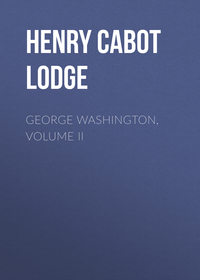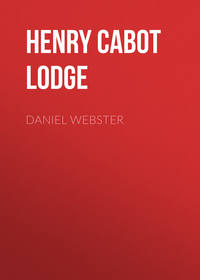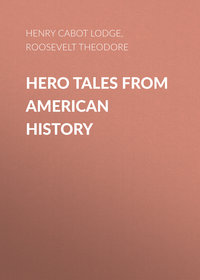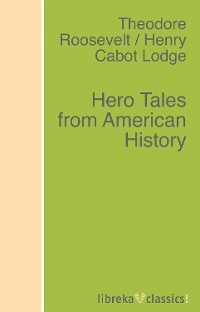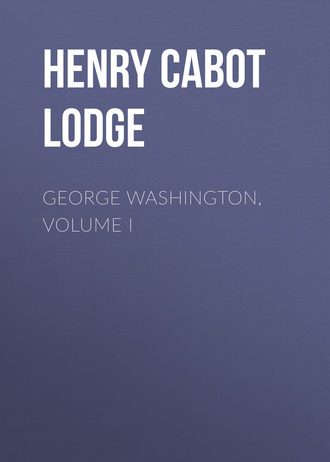 полная версия
полная версияGeorge Washington, Volume I
It is not difficult to sift this home-keeping people, and find out that portion which was Virginia, for the mass was but an appendage of the small fraction which ruled, led, and did the thinking for the whole community. Half the people were slaves, and in that single wretched word their history is told. They were, on the whole, well and kindly treated, but they have no meaning in history except as an institution, and as an influence in the lives, feelings, and character of the men who made the state.
Above the slaves, little better than they in condition, but separated from them by the wide gulf of race and color, were the indented white servants, some convicts, some redemptioners. They, too, have their story told when we have catalogued them. We cross another gulf and come to the farmers, to the men who grew wheat as well as tobacco on their own land, sometimes working alone, sometimes the owners of a few slaves. Some of these men were of the class well known since as the "poor whites" of the South, the weaker brothers who could not resist the poison of slavery, but sank under it into ignorance and poverty. They were contented because their skins were white, and because they were thereby part of an aristocracy to whom labor was a badge of serfdom. The larger portion of this middle class, however, were thrifty and industrious enough. Including as they did in their ranks the hunters and pioneers, the traders and merchants, all the freemen in fact who toiled and worked, they formed the mass of the white population, and furnished the bone and sinew and some of the intellectual power of Virginia. The only professional men were the clergy, for the lawyers were few, and growing to importance only as the Revolution began; while the physicians were still fewer, and as a class of no importance at all. The clergy were a picturesque element in the social landscape, but they were as a body very poor representatives of learning, religion, and morality. They ranged from hedge parsons and Fleet chaplains, who had slunk away from England to find a desirable obscurity in the new world, to divines of real learning and genuine piety, who were the supporters of the college, and who would have been a credit to any society. These last, however, were lamentably few in number. The mass of the clergy were men who worked their own lands, sold tobacco, were the boon companions of the planters, hunted, shot, drank hard, and lived well, performing their sacred duties in a perfunctory and not always in a decent manner.
The clergy, however, formed the stepping-stone socially between the farmers, traders, and small planters, and the highest and most important class in Virginian society. The great planters were the men who owned, ruled, and guided Virginia. Their vast estates were scattered along the rivers from the seacoast to the mountains. Each plantation was in itself a small village, with the owner's house in the centre, surrounded by outbuildings and negro cabins, and the pastures, meadows, and fields of tobacco stretching away on all sides. The rare traveler, pursuing his devious way on horseback or in a boat, would catch sight of these noble estates opening up from the road or the river, and then the forest would close in around him for several miles, until through the thinning trees he would see again the white cabins and the cleared fields of the next plantation.
In such places dwelt the Virginian planters, surrounded by their families and slaves, and in a solitude broken only by the infrequent and eagerly welcomed stranger, by their duties as vestrymen and magistrates, or by the annual pilgrimage to Williamsburg in search of society, or to sit in the House of Burgesses. They were occupied by the care of their plantations, which involved a good deal of riding in the open air, but which was at best an easy and indolent pursuit made light by slave labor and trained overseers. As a result the planters had an abundance of spare time, which they devoted to cock-fighting, horse-racing, fishing, shooting, and fox-hunting,—all, save the first, wholesome and manly sports, but which did not demand any undue mental strain. There is, indeed, no indication that the Virginians had any great love for intellectual exertion. When the amiable attorney-general of Charles II. said to the Virginian commissioners, pleading the cause of learning and religion, "Damn your souls! grow tobacco!" he uttered a precept which the mass of the planters seem to have laid to heart. For fifty years there were no schools, and down to the Revolution even the apologies bearing that honored name were few, and the college was small and struggling. In some of the great families, the eldest sons would be sent to England and to the great universities: they would make the grand tour, play a part in the fashionable society of London, and come back to their plantations fine gentlemen and scholars. Such was Colonel Byrd, in the early part of the eighteenth century, a friend of the Earl of Orrery, and the author of certain amusing memoirs. Such at a later day was Arthur Lee, doctor and diplomat, student and politician. But most of these young gentlemen thus sent abroad to improve their minds and manners led a life not materially different from that of our charming friend, Harry Warrington, after his arrival in England.
The sons who stayed at home sometimes gathered a little learning from the clergyman of the parish, or received a fair education at the College of William and Mary, but very many did not have even so much as this. There was not in truth much use for learning in managing a plantation or raising horses, and men get along surprisingly well without that which they do not need, especially if the acquisition demands labor. The Virginian planter thought little and read less, and there were no learned professions to hold out golden prizes and stimulate the love of knowledge. The women fared even worse, for they could not go to Europe or to William and Mary's, so that after exhausting the teaching capacity of the parson they settled down to a round of household duties and to the cares of a multitude of slaves, working much harder and more steadily than their lords and masters ever thought of doing.
The only general form of intellectual exertion was that of governing. The planters managed local affairs through the vestries, and ruled Virginia in the House of Burgesses. To this work they paid strict attention, and, after the fashion of their race, did it very well and very efficiently. They were an extremely competent body whenever they made up their minds to do anything; but they liked the life and habits of Squire Western, and saw no reason for adopting any others until it was necessary.
There were, of course, vast differences in the condition of the planters. Some counted their acres by thousands and their slaves by hundreds, while others scrambled along as best they might with one plantation and a few score of negroes. Some dwelt in very handsome houses, picturesque and beautiful, like Gunston Hall or Stratford, or in vast, tasteless, and extravagant piles like Rosewell. Others were contented with very modest houses, consisting of one story with a gabled roof, and flanked by two massive chimneys. In some houses there was a brave show of handsome plate and china, fine furniture, and London-made carriages, rich silks and satins, and brocaded dresses. In others there were earthenware and pewter, homespun and woolen, and little use for horses, except in the plough or under the saddle.
But there were certain qualities common to all the Virginia planters. The luxury was imperfect. The splendor was sometimes barbaric. There were holes in the brocades, and the fresh air of heaven would often blow through a broken window upon the glittering silver and the costly china. It was an easy-going aristocracy, unfinished, and frequently slovenly in its appointments, after the fashion of the warmer climates and the regions of slavery.
Everything was plentiful except ready money. In this rich and poor were alike. They were all ahead of their income, and it seems as if, from one cause or another, from extravagance or improvidence, from horses or the gaming-table, every Virginian family went through bankruptcy about once in a generation.
When Harry Warrington arrived in England, all his relations at Castlewood regarded the handsome young fellow as a prince, with his acres and his slaves. It was a natural and pleasing delusion, born of the possession of land and serfs, to which the Virginians themselves gave ready credence. They forgot that the land was so plentiful that it was of little value; that slaves were the most wasteful form of labor; and that a failure of the tobacco crop, pledged before it was gathered, meant ruin, although they had been reminded more than once of this last impressive fact. They knew that they had plenty to eat and drink, and a herd of people to wait upon them and cultivate their land, as well as obliging London merchants always ready to furnish every luxury in return for the mortgage of a crop or an estate. So they gave themselves little anxiety as to the future and lived in the present, very much to their own satisfaction.
To the communities of trade and commerce, to the mercantile and industrial spirit of to-day, such an existence and such modes of life appear distressingly lax and unprogressive. The sages of the bank parlors and the counting-rooms would shake their heads at such spendthrifts as these, refuse to discount their paper, and confidently predict that by no possibility could they come to good. They had their defects, no doubt, these planters and farmers of Virginia. The life they led was strongly developed on the animal side, and was perhaps neither stimulating nor elevating. The living was the reverse of plain, and the thinking was neither extremely high nor notably laborious. Yet in this very particular there is something rather restful and pleasant to the eye wearied by the sight of incessant movement, and to the ear deafened by the continual shout that nothing is good that does not change, and that all change must be good. We should probably find great discomforts and many unpleasant limitations in the life and habits of a hundred years ago on any part of the globe, and yet at a time when it seems as if rapidity and movement were the last words and the ultimate ideals of civilization, it is rather agreeable to turn to such a community as the eighteenth-century planters of Virginia. They lived contentedly on the acres of their fathers, and except at rare and stated intervals they had no other interests than those furnished by their ancestral domain. At the court-house, at the vestry, or in Williamsburg, they met their neighbors and talked very keenly about the politics of Europe, or the affairs of the colony. They were little troubled about religion, but they worshiped after the fashion of their fathers, and had a serious fidelity to church and king. They wrangled with their governors over appropriations, but they lived on good terms with those eminent persons, and attended state balls at what they called the palace, and danced and made merry with much stateliness and grace. Their every-day life ran on in the quiet of their plantations as calmly as one of their own rivers. The English trader would come and go; the infrequent stranger would be received and welcomed; Christmas would be kept in hearty English fashion; young men from a neighboring estate would ride over through the darkening woods to court, or dance, or play the fiddle, like Patrick Henry or Thomas Jefferson; and these simple events were all that made a ripple on the placid stream. Much time was given to sports, rough, hearty, manly sports, with a spice of danger, and these, with an occasional adventurous dash into the wilderness, kept them sound and strong and brave, both in body and mind. There was nothing languid or effeminate about the Virginian planter. He was a robust man, quite ready to fight or work when the time came, and well fitted to deal with affairs when he was needed. He was a free-handed, hospitable, generous being, not much given to study or thought, but thoroughly public-spirited and keenly alive to the interests of Virginia. Above all things he was an aristocrat, set apart by the dark line of race, color, and hereditary servitude, as proud as the proudest Austrian with his endless quarterings, as sturdy and vigorous as an English yeoman, and as jealous of his rights and privileges as any baron who stood by John at Runnymede. To this aristocracy, careless and indolent, given to rough pleasures and indifferent to the finer and higher sides of life, the call came, as it comes to all men sooner or later, and in response they gave their country soldiers, statesmen, and jurists of the highest order, and fit for the great work they were asked to do. We must go back to Athens to find another instance of a society so small in numbers, and yet capable of such an outburst of ability and force. They were of sound English stock, with a slight admixture of the Huguenots, the best blood of France; and although for a century and a half they had seemed to stagnate in the New World, they were strong, fruitful, and effective beyond the measure of ordinary races when the hour of peril and trial was at hand.
CHAPTER II
THE WASHINGTONS
Such was the world and such the community which counted as a small fraction the Washington family. Our immediate concern is with that family, for before we approach the man we must know his ancestors. The greatest leader of scientific thought in this century has come to the aid of the genealogist, and given to the results of the latter's somewhat discredited labors a vitality and meaning which it seemed impossible that dry and dusty pedigrees and barren tables of descent should ever possess. We have always selected our race-horses according to the doctrines of evolution, and we now study the character of a great man by examining first the history of his forefathers.
Washington made so great an impression upon the world in his lifetime that genealogists at once undertook for him the construction of a suitable pedigree. The excellent Sir Isaac Heard, garter king-at-arms, worked out a genealogy which seemed reasonable enough, and then wrote to the president in relation to it. Washington in reply thanked him for his politeness, sent him the Virginian genealogy of his own branch, and after expressing a courteous interest said, in his simple and direct fashion, that he had been a busy man and had paid but little attention to the subject. His knowledge about his English forefathers was in fact extremely slight. He had heard merely that the first of the name in Virginia had come from one of the northern counties of England, but whether from Lancashire or Yorkshire, or one still more northerly, he could not tell. Sir Isaac was not thoroughly satisfied with the correctness of his own work, but presently Baker took it up in his history of Northamptonshire, and perfected it to his own satisfaction and that of the world in general. This genealogy derived Washington's descent from the owners of the manor of Sulgrave, in Northamptonshire, and thence carried it back to the Norman knight, Sir William de Hertburn. According to this pedigree the Virginian settlers, John and Lawrence, were the sons of Lawrence Washington of Sulgrave Manor, and this genealogy was adopted by Sparks and Irving, as well as by the public at large. Twenty years ago, however, Colonel Chester, by his researches, broke the most essential link in the chain forged by Heard and Baker, proving clearly that the Virginian settlers could not have been the sons of Lawrence of Sulgrave, as identified by the garter king-at-arms. Still more recently the mythical spirit has taken violent possession of the Washington ancestry, and an ingenious gentleman has traced the pedigree of our first president back to Thorfinn and thence to Odin, which is sufficiently remote, dignified, and lofty to satisfy the most exacting Welshman that ever lived. Still the breach made by Colonel Chester was not repaired, although many writers, including some who should have known better, clung with undiminished faith to the Heard pedigree. It was known that Colonel Chester himself believed that he had found the true line, coming, it is supposed, through a younger branch of the Sulgrave race, but he died before he had discovered the one bit of evidence necessary to prove an essential step, and he was too conscientiously accurate to leave anything to conjecture. Since then the researches of Mr. Henry E. Waters have established the pedigree of the Virginian Washingtons, and we are now able to know something of the men from whom George Washington drew his descent.
In that interesting land where everything, according to our narrow ideas, is upside down, it is customary, when an individual arrives at distinction, to confer nobility upon his ancestors instead of upon his children. The Washingtons offer an interesting example of the application of this Chinese system in the Western world, for, if they have not been actually ennobled in recognition of the deeds of their great descendant, they have at least become the subjects of intense and general interest. Every one of the name who could be discovered anywhere has been dragged forth into the light, and has had all that was known about him duly recorded and set down. By scanning family trees and pedigrees, and picking up stray bits of information here and there, we can learn in a rude and general fashion what manner of men those were who claimed descent from William of Hertburn, and who bore the name of Washington in the mother-country. As Mr. Galton passes a hundred faces before the same highly sensitized plate, and gets a photograph which is a likeness of no one of his subjects, and yet resembles them all, so we may turn the camera of history upon these Washingtons, as they flash up for a moment from the dim past, and hope to obtain what Professor Huxley calls a "generic" picture of the race, even if the outlines be somewhat blurred and indistinct.
In the North of England, in the region conquered first by Saxons and then by Danes, lies the little village of Washington. It came into the possession of Sir William de Hertburn, and belonged to him at the time of the Boldon Book in 1183. Soon after, he or his descendants took the name of De Wessyngton, and there they remained for two centuries, knights of the palatinate, holding their lands by a military tenure, fighting in all the wars, and taking part in tournaments with becoming splendor. By the beginning of the fifteenth century the line of feudal knights of the palatinate was extinct, and the manor passed from the family by the marriage of Dionisia de Wessyngton. But the main stock had in the mean time thrown out many offshoots, which had taken firm root in other parts and in many counties of England. We hear of several who came in various ways to eminence. There was the learned and vigorous prior of Durham, John de Wessyngton, probably one of the original family, and the name appears in various places after his time in records and on monuments, indicating a flourishing and increasing race. Lawrence Washington, the direct ancestor of the first President of the United States, was, in the sixteenth century, the mayor of Northampton, and received from King Henry VIII. the manor of Sulgrave in 1538. In the next century we find traces of Robert Washington of the Adwick family, a rich merchant of Leeds, and of his son Joseph Washington, a learned lawyer and author, of Gray's Inn. About the same time we hear of Richard Washington and Philip Washington holding high places at University College, Oxford. The Sulgrave branch, however, was the most numerous and prosperous. From the mayor of Northampton were descended Sir William Washington, who married the half-sister of George Villiers, Duke of Buckingham; Sir Henry Washington, who made a desperate defense of Worcester against the forces of the Parliament in 1646; Lieutenant-Colonel James Washington, who fell at the siege of Pontefract, fighting for King Charles; another James, of a later time, who was implicated in Monmouth's rebellion, fled to Holland and became the progenitor of a flourishing and successful family, which has spread to Germany and there been ennobled; Sir Lawrence Washington, of Garsdon, whose grand-daughter married Robert Shirley, Baron Ferrers; and others of less note, but all men of property and standing. They seem to have been a successful, thrifty race, owning lands and estates, wise magistrates and good soldiers, marrying well, and increasing their wealth and strength from generation to generation. They were of Norman stock, knights and gentlemen in the full sense of the word before the French Revolution, and we can detect in them here and there a marked strain of the old Norse blood, carrying with it across the centuries the wild Berserker spirit which for centuries made the adventurous Northmen the terror of Europe. They were a strong race evidently, these Washingtons, whom we see now only by glimpses through the mists of time, not brilliant apparently, never winning the very highest fortune, having their failures and reverses no doubt, but on the whole prudent, bold men, always important in their several stations, ready to fight and ready to work, and as a rule successful in that which they set themselves to do.
In 1658 the two brothers, John and Lawrence, appeared in Virginia. As has been proved by Mr. Waters, they were of the Sulgrave family, the sons of Lawrence Washington, fifth son of the elder Lawrence of Sulgrave and Brington. The father of the emigrants was a fellow of Brasenose College, Oxford, and rector of Purleigh, from which living he was ejected by the Puritans as both "scandalous" and "malignant." That he was guilty of the former charge we may well doubt; but that he was, in the language of the time, "malignant," must be admitted, for all his family, including his brothers, Sir William Washington of Packington, and Sir John Washington of Thrapston, his nephew, Sir Henry Washington, and his nephew-in-law, William Legge, ancestor of the Earl of Dartmouth, were strongly on the side of the king. In a marriage which seems to have been regarded as beneath the dignity of the family, and in the poverty consequent upon the ejectment from his living, we can find the reason for the sons of the Rev. Lawrence Washington going forth into Virginia to find their fortune, and flying from the world of victorious Puritanism which offered just then so little hope to royalists like themselves. Yet what was poverty in England was something much more agreeable in the New World of America. The emigrant brothers at all events seem to have had resources of a sufficient kind, and to have been men of substance, for they purchased lands and established themselves at Bridges Creek, in Westmoreland County. With this brief statement, Lawrence disappears, leaving us nothing further than the knowledge that he had numerous descendants. John, with whom we are more concerned, figures at once in the colonial records of Maryland. He made complaint to the Maryland authorities, soon after his arrival, against Edward Prescott, merchant, and captain of the ship in which he had come over, for hanging a woman during the voyage for witchcraft. We have a letter of his, explaining that he could not appear at the first trial because he was about to baptize his son, and had bidden the neighbors and gossips to the feast. A little incident this, dug out of the musty records, but it shows us an active, generous man, intolerant of oppression, public-spirited and hospitable, social, and friendly in his new relations. He soon after was called to mourn the death of his English wife and of two children, but he speedily consoled himself by taking a second wife, Anne Pope, by whom he had three children, Lawrence, John, and Anne. According to the Virginian tradition, John Washington the elder was a surveyor, and made a location of lands which was set aside because they had been assigned to the Indians. It is quite apparent that he was a forehanded person who acquired property and impressed himself upon his neighbors. In 1667, when he had been but ten years in the colony, he was chosen to the House of Burgesses; and eight years later he was made a colonel and sent with a thousand men to join the Marylanders in destroying the "Susquehannocks," at the "Piscataway" fort, on account of some murdering begun by another tribe. As a feat of arms, the expedition was not a very brilliant affair. The Virginians and Marylanders killed half a dozen Indian chiefs during a parley, and then invested the fort. After repulsing several sorties, they stupidly allowed the Indians to escape in the night and carry murder and pillage through the outlying settlements, lighting up first the flames of savage war and then the fiercer fire of domestic insurrection. In the next year we hear again of John Washington in the House of Burgesses, when Sir William Berkeley assailed his troops for the murder of the Indians during the parley. Popular feeling, however, was clearly with the colonel, for nothing was done and the matter dropped. At that point, too, in 1676, John Washington disappears from sight, and we know only that as his will was proved in 1677, he must have died soon after the scene with Berkeley. He was buried in the family vault at Bridges Creek, and left a good estate to be divided among his children. The colonel was evidently both a prudent and popular man, and quite disposed to bustle about in the world in which he found himself. He acquired lands, came to the front at once as a leader although a new-comer in the country, was evidently a fighting man as is shown by his selection to command the Virginian forces, and was honored by his neighbors, who gave his name to the parish in which he dwelt. Then he died and his son Lawrence reigned in his stead, and became by his wife, Mildred Warner, the father of John, Augustine, and Mildred Washington.


